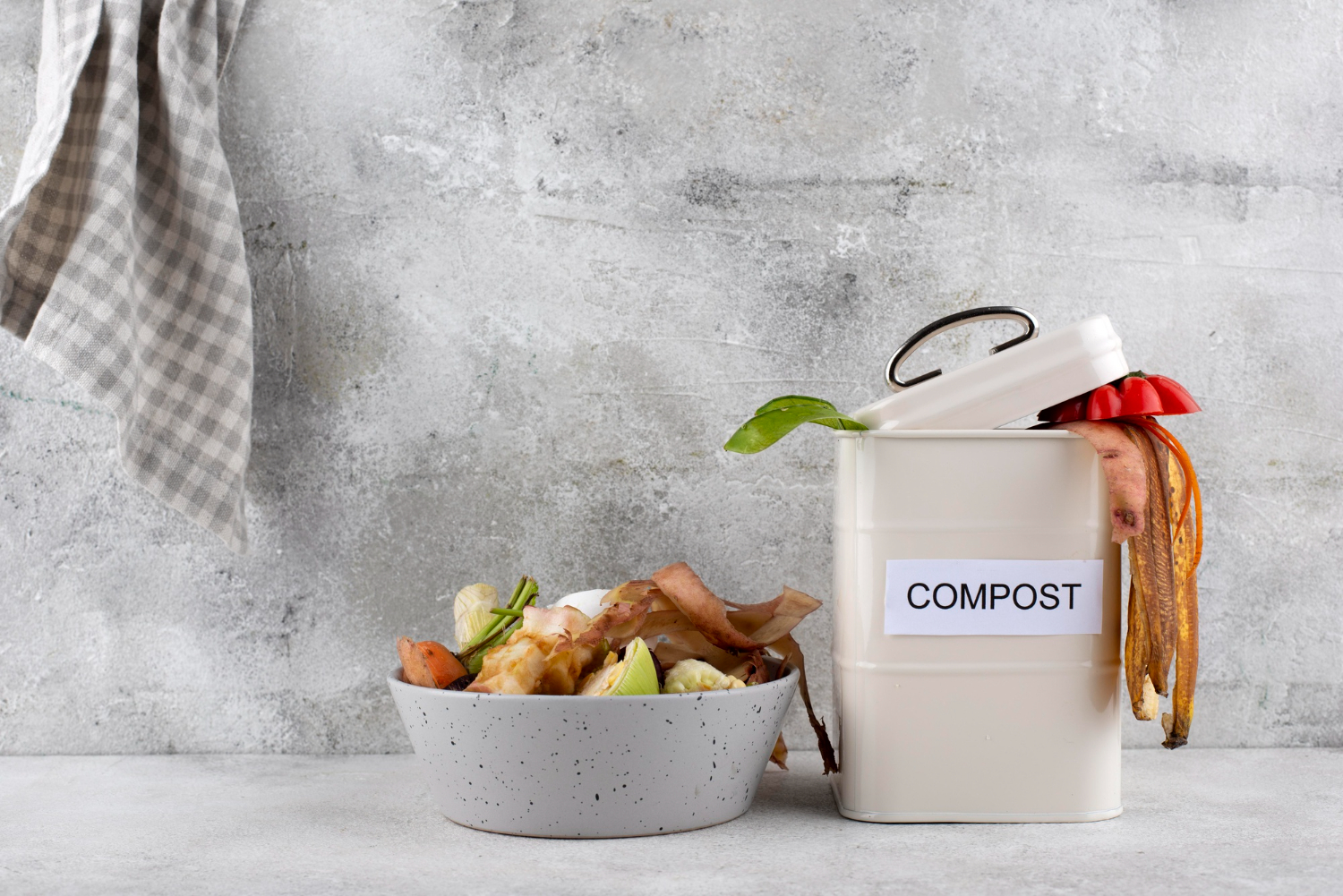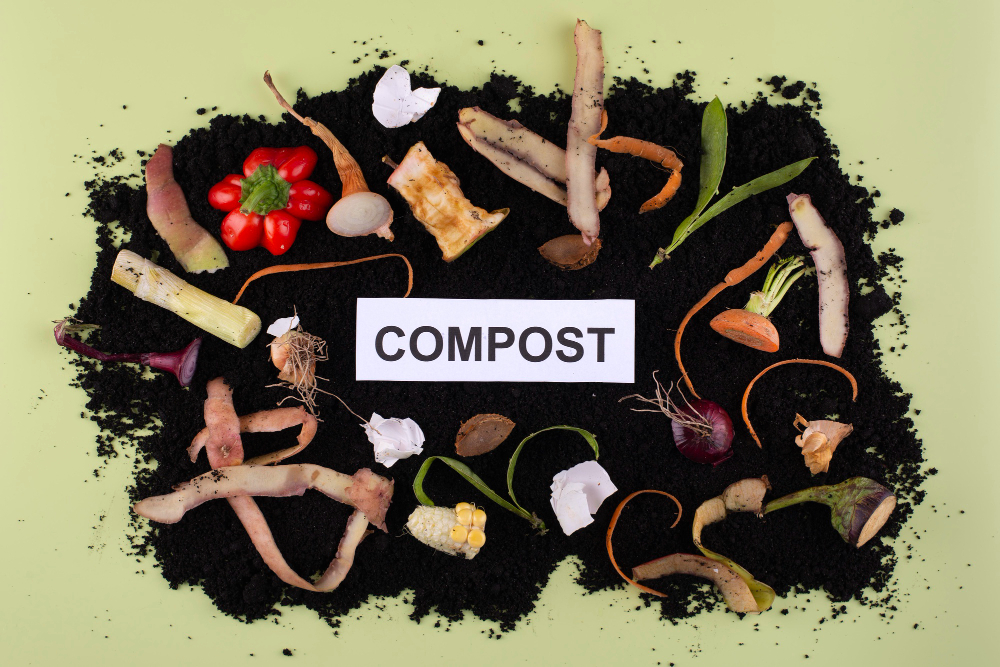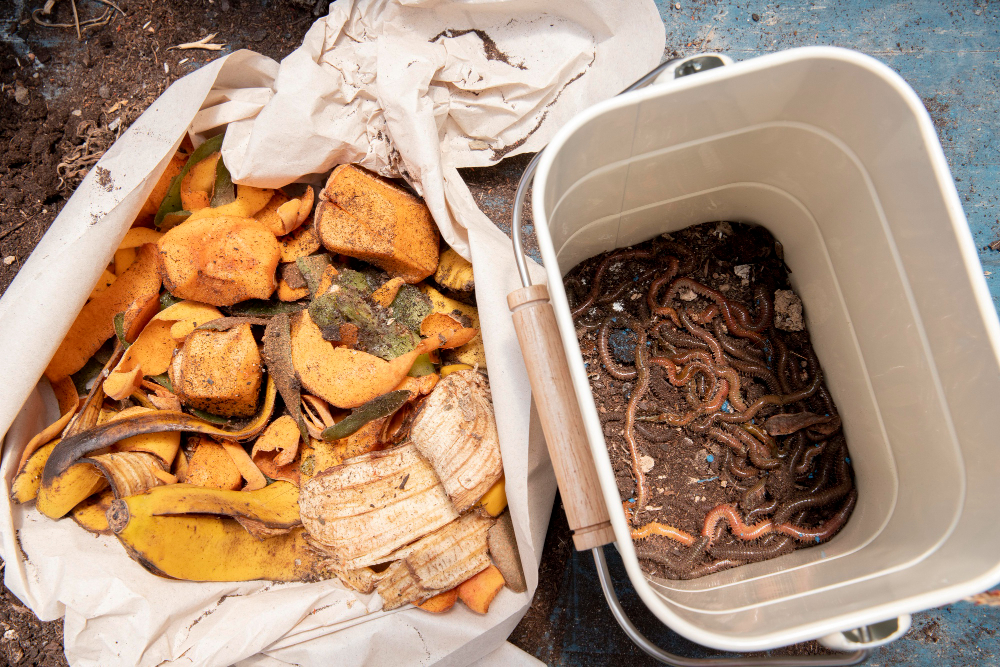Introduction to Composting
What is Composting?
Composting is the natural process of recycling organic matter, such as leaves and food scraps, into a valuable fertilizer that can enrich soil and plants. This process is a key component of sustainable waste management and plays a significant role in reducing the amount of waste sent to landfills.
Definition of Composting
Composting is a controlled, aerobic (oxygen-required) process that converts organic materials into a nutrient-rich soil amendment known as compost. It involves the decomposition of organic matter by microorganisms, including bacteria and fungi.
Brief History of Composting
The practice of composting has been around for thousands of years. Ancient civilizations, such as the Greeks and Romans, used compost to improve soil fertility. In recent times, the importance of composting has been recognized as a sustainable solution to waste management and environmental conservation.
The Importance of Composting
Understanding the importance of composting is essential for promoting sustainable practices and reducing our environmental footprint.
Environmental Benefits
Composting helps divert organic waste from landfills, where it would otherwise produce methane, a potent greenhouse gas. By reducing methane emissions, composting helps mitigate climate change.
Soil Health
Compost improves soil structure, enhances its ability to retain moisture, and provides essential nutrients to plants. It also supports beneficial microorganisms that contribute to soil health and fertility.
Benefits of Composting
Environmental Benefits
The environmental benefits of composting are numerous, making it a vital practice for sustainable living.
Reducing Waste
One of the primary benefits of composting is the significant reduction in the amount of waste sent to landfills. By composting organic waste, we can reduce the burden on landfills and decrease the environmental impact of waste disposal.
Lowering Greenhouse Gas Emissions
Organic waste in landfills generates methane, a greenhouse gas that is more potent than carbon dioxide. Composting helps lower greenhouse gas emissions by diverting organic waste from landfills and converting it into a useful product.
Economic Benefits
Composting also offers economic advantages, including cost savings and job creation.
Cost Savings
Composting can reduce the costs associated with waste disposal and landfill management. It also provides a cost-effective alternative to chemical fertilizers, as compost is a natural and free source of nutrients for plants.
Job Creation
The composting industry creates jobs in various sectors, including waste collection, compost production, and distribution. It also supports local economies by promoting the use of locally produced compost.
Types of Composting
Home Composting
Home composting is a simple and effective way for individuals to manage their organic waste and produce compost for personal use.
Backyard Composting
Backyard composting involves creating a compost pile or using a compost bin to decompose organic materials, such as kitchen scraps, yard waste, and paper products. This method is suitable for those with outdoor space and a garden.
Vermicomposting
Vermicomposting uses worms, typically red wigglers, to break down organic matter. This method is ideal for small-scale composting and can be done indoors or outdoors. Vermicomposting produces nutrient-rich worm castings that can be used as a soil amendment.
Commercial Composting
Commercial composting involves large-scale operations that manage organic waste from various sources, including households, businesses, and municipalities.
Industrial Composting
Industrial composting facilities process large volumes of organic waste using advanced techniques and equipment. These facilities can handle a wide range of materials, including food scraps, yard waste, and biodegradable packaging.
Municipal Composting Programs
Many municipalities offer composting programs that collect organic waste from residents and businesses. These programs often provide curbside collection services and operate centralized composting facilities.
The Composting Process
Collection and Preparation
The first step in the composting process is the collection and preparation of organic materials.
Collecting Organic Waste
Organic waste can be collected from various sources, including kitchens, gardens, and farms. Common materials for composting include fruit and vegetable scraps, coffee grounds, yard trimmings, and paper products.
Preparing Materials
To ensure efficient decomposition, it’s important to prepare materials by chopping them into smaller pieces. This increases the surface area for microorganisms to work on and speeds up the composting process.
Decomposition
Decomposition is the process by which microorganisms break down organic matter into compost.
Microbial Activity
Microorganisms, including bacteria, fungi, and actinomycetes, play a crucial role in breaking down organic matter. These microorganisms require oxygen, moisture, and a balanced carbon-to-nitrogen ratio to thrive.
Stages of Decomposition
Decomposition occurs in several stages, starting with the mesophilic (moderate temperature) phase, followed by the thermophilic (high temperature) phase, and ending with the maturation phase. Each stage involves different microorganisms and conditions.
Key Points on the Importance of Composting
Environmental Protection
Composting protects the environment by reducing waste, lowering greenhouse gas emissions, and conserving natural resources.
Soil Health
Compost improves soil health by enhancing its structure, increasing moisture retention, and providing essential nutrients.
Economic Benefits
Composting offers economic benefits, including cost savings and job creation, contributing to sustainable economic growth.
Factors Affecting Composting
Carbon-to-Nitrogen Ratio
The carbon-to-nitrogen (C) ratio is a critical factor in the composting process.
Importance of the CRatio
A balanced Cratio of about 30:1 is ideal for composting. Carbon-rich materials, such as leaves and straw, provide energy for microorganisms, while nitrogen-rich materials, such as food scraps and grass clippings, support their growth and reproduction.
Adjusting the CRatio
To achieve the optimal Cratio, it’s important to mix different types of organic materials. For example, adding leaves or straw to a pile of food scraps can help balance the Cratio.
Moisture and Aeration
Moisture and aeration are essential for maintaining microbial activity and promoting efficient decomposition.
Moisture Levels
The compost pile should be kept moist, but not waterlogged. A moisture level of about 50-60% is ideal. If the pile is too dry, decomposition will slow down. If it’s too wet, it can become anaerobic (lack of oxygen), leading to unpleasant odors.
Aeration Techniques
Regularly turning the compost pile helps maintain aeration by introducing oxygen and preventing compaction. Aeration can also be improved by adding bulky materials, such as straw or wood chips, which create air pockets within the pile.
Composting Methods
Hot Composting
Hot composting is a fast and efficient method that produces compost in a relatively short period.
How Hot Composting Works
Hot composting involves maintaining high temperatures (130-160°F) in the compost pile, which accelerates the decomposition process. This method requires regular turning and careful monitoring of moisture and temperature.
Benefits of Hot Composting
Hot composting produces compost quickly, typically within a few months. The high temperatures also help kill pathogens and weed seeds, resulting in a clean and safe product.
Cold Composting
Cold composting is a slower method that requires less maintenance and produces compost over a longer period.
How Cold Composting Works
Cold composting involves piling up organic materials and allowing them to decompose naturally over time. This method requires minimal turning and monitoring.
Benefits of Cold Composting
Cold composting is low-maintenance and suitable for those who prefer a hands-off approach. It produces compost within 6 months to 2 years, depending on the materials and conditions.
Using Compost
In the Garden
Compost is an excellent soil amendment for gardens, providing numerous benefits for plants and soil health.
Soil Enrichment
Adding compost to garden soil improves its structure, increases moisture retention, and provides essential nutrients for plant growth. It also supports beneficial microorganisms that contribute to soil fertility.
Mulching
Compost can be used as a mulch to suppress weeds, retain moisture, and protect plant roots. Applying a layer of compost around plants helps create a healthy and thriving garden ecosystem.
On the Farm
Farmers can benefit from using compost to enhance soil health and improve crop yields.
Soil Fertility
Compost enriches farm soil with organic matter, improving its structure and fertility. It also provides a slow-release source of nutrients, reducing the need for chemical fertilizers.
Erosion Control
Applying compost to farm fields helps prevent soil erosion by improving soil structure and increasing its ability to retain moisture. This promotes healthy plant growth and reduces runoff.
Pros and Cons of Composting
Pros of Composting
The importance of composting lies in its numerous benefits for the environment, soil health, and economy.
Environmental Protection
Composting reduces waste, lowers greenhouse gas emissions, and conserves natural resources, contributing to environmental protection.
Soil Improvement
Compost improves soil structure, increases moisture retention, and provides essential nutrients, enhancing soil health and fertility.
Cons of Composting
While composting offers many benefits, there are also some challenges and drawbacks to consider.
Time and Effort
Composting requires time and effort to manage the pile, maintain optimal conditions, and produce high-quality compost. It may not be suitable for those with limited time or resources.
Space Requirements
Composting requires space for the compost pile or bin, which may be a limitation for those with small yards or living in urban areas.
Composting and Climate Change
Reducing Greenhouse Gas Emissions
Composting plays a significant role in mitigating climate change by reducing greenhouse gas emissions.
Methane Reduction
Diverting organic waste from landfills to composting reduces methane emissions, as composting is an aerobic process that does not produce methane.
Carbon Sequestration
Compost application enhances soil carbon sequestration by increasing soil organic matter, which helps capture and store carbon dioxide from the atmosphere.
Supporting Sustainable Agriculture
Composting supports sustainable agriculture by improving soil health and reducing the need for chemical inputs.
Nutrient Cycling
Composting promotes nutrient cycling by returning organic matter and nutrients to the soil, reducing the reliance on synthetic fertilizers.
Soil Health
Healthy soils with high organic matter content are more resilient to climate change impacts, such as drought and extreme weather events.
Community Composting
Benefits of Community Composting
Community composting initiatives offer numerous benefits for local communities and the environment.
Waste Reduction
Community composting programs help divert organic waste from landfills, reducing waste disposal costs and environmental impact.
Education and Engagement
Community composting projects provide educational opportunities for residents to learn about composting, waste reduction, and sustainable living.
Starting a Community Composting Program
Starting a community composting program requires planning, resources, and community involvement.
Planning and Resources
Identify a suitable location, secure funding, and gather necessary equipment and materials for the composting site.
Community Involvement
Engage community members through outreach, education, and volunteer opportunities to ensure the program’s success and sustainability.
Composting in Schools
Educational Benefits
Composting in schools offers valuable educational opportunities for students to learn about sustainability and environmental stewardship.
Hands-On Learning
Composting provides hands-on learning experiences, teaching students about the science of decomposition, nutrient cycling, and soil health.
Environmental Awareness
School composting programs raise environmental awareness and promote sustainable practices among students, staff, and the broader community.
Implementing a School Composting Program
Implementing a school composting program involves planning, education, and collaboration.
Planning and Setup
Identify a suitable location for the composting site, gather materials, and develop a plan for managing the composting process.
Education and Engagement
Educate students and staff about composting and involve them in the process through classroom activities, workshops, and hands-on participation.
Composting and Waste Management Policies
Local and National Policies
Local and national policies play a crucial role in promoting composting and sustainable waste management practices.
Regulations and Incentives
Policies that mandate or incentivize composting can encourage individuals and businesses to participate in composting programs and reduce organic waste.
Public Awareness Campaigns
Governments can run public awareness campaigns to educate residents about the importance of composting and how to participate in local programs.
Global Initiatives
Global initiatives and organizations are working to promote composting and sustainable waste management practices worldwide.
United Nations Sustainable Development Goals
The United Nations Sustainable Development Goals (SDGs) include targets for reducing waste and promoting sustainable consumption and production practices, which align with composting initiatives.
International Composting Organizations
Organizations such as the International Compost Alliance work to promote composting practices globally, sharing knowledge and resources to support composting initiatives.
Conclusion: The Importance of Composting
Embracing Composting for a Sustainable Future
Embracing composting is essential for building a sustainable future and addressing the challenges of waste management and environmental conservation.
Personal Responsibility
Individuals can make a significant impact by composting their organic waste, reducing their environmental footprint, and promoting sustainable practices in their communities.
Collective Efforts
Collective efforts from governments, businesses, and communities are crucial for expanding composting initiatives and achieving sustainable waste management goals.
Taking Action
Taking action on composting involves education, participation, and advocacy.
Educate Yourself and Others
Learn about the importance of composting and share this knowledge with others to raise awareness and encourage participation.
Participate in Composting Programs
Join or start a composting program in your community, school, or workplace to contribute to sustainable waste management.
Advocate for Policy Changes
Advocate for policies that promote composting and sustainable waste management practices at the local, national, and global levels.
FAQs
- What is composting?
- Composting is the natural process of recycling organic matter, such as leaves and food scraps, into a valuable fertilizer that enriches soil and plants.
- Why is composting important?
- Composting is important because it reduces waste, lowers greenhouse gas emissions, improves soil health, and supports sustainable agriculture.
- What materials can be composted?
- Materials that can be composted include fruit and vegetable scraps, coffee grounds, yard trimmings, paper products, and more.
- How does composting benefit the environment?
- Composting benefits the environment by reducing waste, conserving natural resources, and lowering greenhouse gas emissions.
- What is the carbon-to-nitrogen ratio in composting?
- The ideal carbon-to-nitrogen ratio for composting is about 30:1, which balances the needs of microorganisms for energy and growth.
- What are the different methods of composting?
- Different methods of composting include hot composting, cold composting, vermicomposting, and commercial composting.
- How can I start composting at home?
- You can start composting at home by setting up a compost pile or bin, collecting organic waste, and maintaining the right conditions for decomposition.
- What are the pros and cons of composting?
- Pros of composting include environmental protection and soil improvement, while cons include time, effort, and space requirements.
- How does composting support sustainable agriculture?
- Composting supports sustainable agriculture by improving soil health, enhancing nutrient cycling, and reducing the need for chemical inputs.
- What role do policies play in promoting composting?
- Policies play a crucial role in promoting composting by mandating or incentivizing composting practices, running public awareness campaigns, and supporting composting programs.




